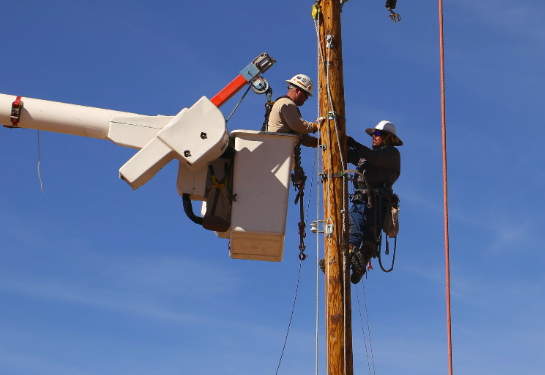
- Details
- By Native News Online Staff
U.S. Secretary of the Interior Deb Haaland (Laguna Pueblo) on Tuesday announced $72 million to help provide electricity to homes in several tribal communities. The funds come from President Biden’s Investing in America agenda from the Inflation Reduction Act.
Across Indian Country, more than 16,000 Tribal homes and 54,000 residents lack electricity, with a majority of unelectrified homes located in the Navajo Nation and Hopi Tribe.
Tuesday’s announcement was for the first round of funding from the Office of Indian Affairs’ Tribal Electrification Program will provide financial and technical assistance to 21 Tribes to connect homes to transmission and distribution that is powered by clean energy; provide electricity to unelectrified tribal homes through zero-emissions energy systems; transition electrified tribal homes to zero-emissions energy systems; and support associated home repairs and retrofitting necessary to install the zero-emissions energy systems. The program will also support clean energy workforce development opportunities in Indian Country.
“Every home deserves to have access to reliable, affordable electricity – and now, with historic investments from President Biden’s Investing in America agenda, we’re bringing much-needed resources to Indian Country to electrify homes with abundant clean energy sources,” Secretary Deb Haaland said. “As we implement this new and innovative program, we will continue to support tribal communities as they work to develop their electricity infrastructure and help meet our shared clean energy goals.”
Secretary Haaland made the announcement during a visit to the Hopi Tribe in Arizona, which is receiving $4.2 million through these awards. The visit comes as Secretary Haaland and Assistant Secretary for Indian Affairs Bryan Newland conclude a multi-day trip that included visits with the White Mountain Apache and the Pueblo of Zuni in New Mexico to highlight how historic resources from the President’s Investing in America agenda are supporting Indigenous communities.
“Indian Country’s revitalization and future depends on Tribal households, schools and businesses having access to clean, reliable power,” said Assistant Secretary Newland. “The Tribal Electrification Program is important for providing Tribes a much-needed boost to their efforts of closing the access-to-electricity gap in their communities.”
In 2000, the Energy Information Administration issued a report which estimated that 14 percent of households on Native American reservations had no access to electricity, which was 10 times higher than the national average. In 2022, the Department of Energy Office of Indian Energy issued a report citing that 16,805 total Tribal homes were unelectrified, with most being in the Southwest region and Alaska. By recognizing that each Tribe has its own energy- and electrification-related needs and implementation capacity, this program will meet the unique needs of individual Tribal communities.
The Tribal Electrification Program also advances the Biden-Harris administration’s Justice40 Initiative, which was established by President Biden as part of his January 2021 Executive Order 14008, Tackling the Climate Crisis at Home and Abroad, and which set the goal that 40 percent of the overall benefits of certain federal investments flow to disadvantaged communities that have been marginalized by underinvestment and overburdened by pollution, including federally recognized Tribal Nations, which are recognized as Justice40 communities.
The 2024 grant recipients are:
|
Tribe or Tribal Organization |
State |
Funding |
|
Levelock Village |
Alaska |
$333,813 |
|
Kootznoowoo, Incorporated |
Alaska |
$500,000 |
|
Chickaloon Native Village |
Alaska |
$7,767,520 |
|
Tanana Chiefs Conference |
Alaska |
$9,922,060 |
|
San Carlos Apache Tribe |
Arizona |
$360,000 |
|
Hopi Utilities Corporation |
Arizona |
$4,200,000 |
|
Navajo Tribal Utility Authority |
Arizona, New Mexico and Utah |
$10,000,000 |
|
Cachil Dehe Band of Wintun Indians, Colusa Rancheria |
California |
$250,000 |
|
Santa Rosa Band of Cahuilla Indians |
California |
$250,000 |
|
Yurok Tribe |
California |
$3,271,068 |
|
Guidiville Rancheria of California |
California |
$3,552,350 |
|
Shoshone Paiute Tribes |
Idaho and Nevada |
$525,000 |
|
Prairie Band Potawatomi Nation |
Kansas |
$305,000 |
|
Iowa Tribe of Kansas and Nebraska |
Kansas |
$9,400,000 |
|
Bois Forte Band of Chippewa |
Minnesota |
$295,000 |
|
Prairie Island Indian Community |
Minnesota |
$500,000 |
|
Red Lake Band of Chippewa Indians |
Minnesota |
$600,000 |
|
Pueblo of Santa Ana |
New Mexico |
$14,500,000 |
|
Rosebud Sioux Tribe |
South Dakota |
$1,000,000 |
|
Quinault Indian Nation |
Washington |
$3,650,000 |
|
Eastern Shoshone Housing Authority |
Wyoming |
$1,000,000 |
|
Total |
$72,181,811 |
|
More Stories Like This
Native News Weekly (August 25, 2024): D.C. BriefsUS Presidents in Their Own Words Concerning American Indians
Native America Celebrates the Winter Solstice
Tlingit & Haida Launch New Foundation to Support Education, Wellness
Michigan Attorney General Opens Criminal Investigation into Indian Boarding Schools
Help us defend tribal sovereignty.
At Native News Online, our mission is rooted in telling the stories that strengthen sovereignty and uplift Indigenous voices — not just at year’s end, but every single day.
Because of your generosity last year, we were able to keep our reporters on the ground in tribal communities, at national gatherings and in the halls of Congress — covering the issues that matter most to Indian Country: sovereignty, culture, education, health and economic opportunity.
That support sustained us through a tough year in 2025. Now, as we look to the year ahead, we need your help right now to ensure warrior journalism remains strong — reporting that defends tribal sovereignty, amplifies Native truth, and holds power accountable.
 The stakes couldn't be higher. Your support keeps Native voices heard, Native stories told and Native sovereignty defended.
The stakes couldn't be higher. Your support keeps Native voices heard, Native stories told and Native sovereignty defended.
Stand with Warrior Journalism today.
Levi Rickert (Potawatomi), Editor & Publisher


